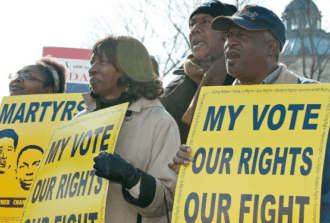MONTGOMERY, ALA. and WASHINGTON, D.C., September 7, 2016 – Yesterday, the Lawyers’ Committee for Civil Rights Under Law (Lawyers’ Committee), filed a lawsuit on behalf of the Alabama State Conference of the NAACP and four individual black voters alleging that the method of electing Alabama’s most powerful judges violates the Voting Rights Act. The suit maintains that Alabama’s statewide method of electing members of the Alabama Supreme Court, Court of Criminal Appeals and Court of Civil Appeals deprives the African-American community of the ability to elect any judges of their choice. Currently, all 19 of Alabama’s appellate judges are white.“In 2016, Alabama’s appellate courts are no more diverse than they were when the Voting Rights Act was signed more than 50 years ago,” said Kristen Clarke, president and executive director of the Lawyers’ Committee. “It is time for the highest courts in the state of Alabama to reflect the diversity of the communities they serve. This lawsuit seeks to provide African-American voters an equal opportunity to elect judges of their choice, achieve long overdue compliance with the Voting Rights Act and instill greater public confidence in the justice system of Alabama.”
The Supreme Court of Alabama has nine members and is the state’s court of last resort. Alabama’s intermediate appellate courts, the Court of Criminal Appeals and the Court of Civil Appeals, each has five members. All 19 judges are elected statewide. Because white Alabamians comprise the majority of the voting age population in the state, and because of racially polarized voting, black-preferred candidates are consistently defeated in elections involving the highest levels of the state’s judiciary. Such vote dilution is prohibited by the Voting Rights Act and the state could easily devise a fairer electoral system.
The Lawyers’ Committee filed today’s suit in partnership with James Blacksher and Edward Still, two long-time Alabama civil rights attorneys, Montgomery-based attorney J. Mitch McGuire, as well as with pro bono counsel Crowell & Moring LLP and Stroock & Stroock & Lavan LLP. The suit was filed in the U.S. District Court for the Middle District of Alabama and is part of the Lawyers’ Committee’s national initiative to bring state courts into compliance with the Voting Rights Act and promote judicial diversity. On July 20, 2016, the Lawyers’ Committee and another set of partners filed a similar suit alleging that the statewide method of electing Texas’s most powerful judges violates the Voting Rights Act.
In the history of Alabama, only two African Americans have won an election to statewide office. Every other black statewide candidate has been defeated by a white candidate. Alabama’s appellate judges have been all-white for 15 years.
“The Alabama NAACP continues to fight for equitable representation of all communities in our judicial system at all levels,” said Benard Simelton, president of the Alabama NAACP. “Alabama cannot continue to have a system that ignores segments of the community. We believe that a revised method of electing judges will lead to representation of all segments of the community.”
“The fact that no African-Americans are on the Alabama Supreme Court or any other office elected statewide sends a clear message that black Alabamians remain subordinate to whites in state government, just as the 1901 Constitution intended,” said James Blacksher.
“Jurors are supposed to represent all of the adult population, yet the State uses a system of electing appellate judges that insures those judges come from only part of the population,” said Edward Still.
Alabama has the sixth largest black population in the country with African Americans comprising almost 25 percent of the state’s voting age population. However, with voting polarized along racial lines, African Americans have been underrepresented on the three courts at issue for decades. In 1991, the U.S. Supreme Court made clear that the Voting Rights Act applies to judicial elections.
The courts at issue in this case handle cases of all kinds, including important criminal cases. Notably, nearly 63 percent of Alabama’s prison population is black.
“The right to vote is essential to our democracy, and that right must be meaningful for our system of government to function properly,” said Crowell & Moring partner Richard Schwartz. His partner Keith Harrison explained, “We believe that African Americans must have an effective part in the election of appellate judgeships in Alabama. When judges are elected, equal justice under the law requires meaningful voting rights for all citizens, including Alabama’s African-American citizens.”
“The right to vote is the right from which all other rights flow,” said Michael Keats of Stroock & Stroock & Lavan. “That right to vote takes on a special significance in electing the judges and justices who define our legal rights and obligations, who adjudicate our guilt and innocence. A judiciary elected through a racially-discriminatory system like Alabama’s, deprives African-Americans of their own voice in the administration of justice. That is illegal and this lawsuit will end that discriminatory system.”
To read the full complaint, click here.
About the Lawyers’ Committee:
The Lawyers’ Committee for Civil Rights Under Law (Lawyers’ Committee), a nonpartisan, nonprofit organization, was formed in 1963 at the request of President John F. Kennedy to involve the private bar in providing legal services to address racial discrimination. Formed over 50 years ago, we continue our quest of “Moving America Toward Justice.” The principal mission of the Lawyers’ Committee is to secure, through the rule of law, equal justice under law, particularly in the areas of fair housing and community development; employment; voting; education; and criminal justice. For more information about the Lawyers’ Committee, visit www.lawyerscommittee.org.



